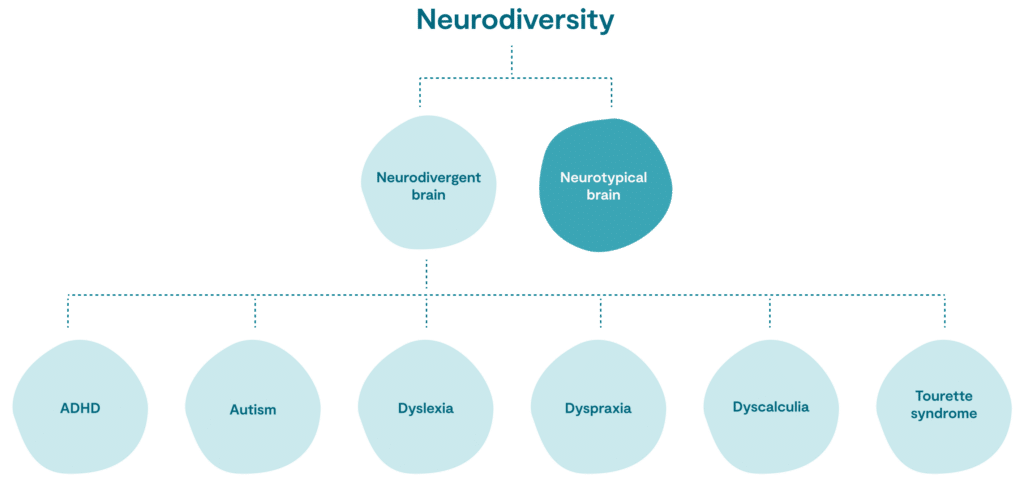Understanding Neurodiversity
April 1, 2024
Neurodiversity is a concept that describes how all our brains are different and recognizes the differences in how we think, behave, communicate, and experience the world around us.
Neurodiversity distills these differences into two main categories: neurotypical and neurodivergent. People with neurodivergent brains tend to think, learn, and interact with the world differently than people with neurotypical brains.
Embracing neurodiversity differences
The fact is, neurodivergent challenges often come from being in a world that doesn’t support neurodivergent needs. Looking back at history can show how changes in society brought new challenges for people with neurodivergent brains. For example, people became aware of dyslexia when reading instruction in schools first began. Similarly, ADHD became more common when lifestyles became less active during the Industrial Revolution. So, the challenges that people with neurodivergent brains might experience often come from society rather than from personal “shortcomings.”
Estimates suggest that 15% to 20% of the global population has a neurodivergent brain. Due to the time and cost of professional evaluations, not everyone with a neurodivergent brain receives a diagnosis. Neurodivergence is linked to a range of conditions, such as attention-deficit/hyperactivity disorder (ADHD) and others. Each condition is associated with unique strengths and challenges.
There’s still ongoing debate among experts about which conditions are classified as neurodivergent. The chart below includes a few neurodivergent conditions, but not all.

People with the same condition(s) also differ from each other, and it’s important to recognize the unique qualities of each individual. When we celebrate neurodiversity, it helps us honor the many strengths in the neurodivergent community.
Due to stigma and a lack of awareness, the conditions linked to neurodiversity are sometimes viewed as shortcomings. It’s important to remember that there’s no “right” way to think, learn, or behave. Celebrating neurodiversity means compassionately understanding and embracing our differences while providing support for unique needs.
These unique needs also include individual preferences for the words they use to describe their neurodiversity. Some people prefer to use “identity-first” language, such as “I’m an autistic person.” Others prefer to use “person-first” language, such as “I’m a person with autism.” It’s important to ask others their preferences when talking about neurodiversity.
Understanding society’s influence on neurodivergent challenges can help us better appreciate neurodivergent contributions. This perspective also sheds light on the link between neurodivergence and mental health concerns.
Neurodivergence and mental health
Having a neurodivergent brain doesn’t equate to having mental health struggles. Individuals with neurodivergent brains can have strong mental health. Still, evidence shows that the neurodivergent community is at higher risk for mental distress.
One study revealed that the autism community experiences lower self-esteem and higher depression and anxiety levels compared to the neurotypical community. The study also found that having a positive view of one’s autism was linked to less depression and anxiety. Another study found that hiding one’s autistic behaviors is linked to mental health challenges. This hiding is known as “masking.”
These studies suggest that we can support neurodivergent well-being by accepting and embracing neurodivergent identities. People in the neurodivergent community can explore safe ways to “unmask” and be their authentic selves. Meanwhile, those in the neurotypical community can educate themselves, celebrate neurodiversity differences, and lead with kindness.
Neurodivergent “masking”
Masking, or hiding one’s neurodivergence, is a result of stigma, rejection, and bullying. Masking can be an attempt to protect oneself from the harms of stigma and from being seen as different. Understandably, those who belong to other marginalized groups, like the LGBTQIA+ community and people of color, may have an even stronger need or urge to mask.
When in a safe environment, unmasking can support neurodivergent well-being and foster a more inclusive, vibrant community. If you are neurodivergent or you know a friend or coworker who is, consider the following ideas for unmasking:
- Join neurodivergent groups. Neurodivergent groups can offer opportunities for sharing experiences, feeling understood, and celebrating your authentic self. Consider joining online forums, social media groups, or in-person gatherings dedicated to neurodiversity.
- Explore passions and express joy. Allow yourself to embrace your passions. Consider engaging in beloved hobbies, rediscovering a past passion, or connecting with others who share your interests.
- Personalize your surroundings. Create a supportive environment tailored to your strengths and needs. For example, you might carry fidget toys, use noise-canceling headphones, or reference visual aids. You could also display neurodiversity-affirming posters, stickers, or other gear.
- Seek neurodiversity-affirming care. For more support with unmasking, consider working with a mental health provider who understands neurodiversity. Care that affirms neurodiversity understands and honors neurodivergent strengths and needs in addition to other aspects of life. Look for providers who understand neurodiversity and have expertise in areas where you might need support (work stress, etc.).
How the neurotypical community can help
People with neurotypical brains can help promote a more inclusive society that embraces neurodiversity and that supports the well-being of the neurodivergent community. Everyone benefits from a society that embraces unique ways of thinking, learning, and interacting. Ideas for supporting a neurodivergent co-worker or loved one could include:
- Learn more about neurodivergent conditions. Deepen your understanding of these conditions and challenge misconceptions by listening to the voices of those in the neurodivergent community. Explore reputable online organizations specializing in neurodiversity, or check local libraries.
- Speak positively about neurodiversity. When discussing neurodiversity, highlight the strengths and contributions of folks from the neurodivergent community. You can also discuss ways to make the environment more inclusive and use words that celebrate neurodiversity.
- Nurture a more inclusive environment. Seek diverse perspectives to show that you value the neurodivergent community. You can also adjust your communication style or physical space to support neurodivergent needs. For example, offer flexible ways to communicate (writing or speaking, etc.). Or, ask about lighting preferences (dim or bright, etc.). Additionally, offer movement breaks, and ask permission before making physical contact or entering someone’s personal space.
Get tailored support from Lyra Health
Lyra stands strong in our commitment to embrace neurodiversity, and we invite you to join us in building a world that values and encourages inclusivity.
Get support for embracing neurodiversity
Explore our self-care resources and our coaching and therapy offerings.
Author
The Lyra Team
The Lyra Team is made up of clinicians, writers, and experts who are passionate about mental health and workplace well-being. With backgrounds in clinical psychology, journalism, content strategy, and product marketing, we create research-backed content to help individuals and organizations improve workforce mental health.
Explore additional blogs

Mental health tips
How Radical Acceptance Can Decrease Your Stress

Mental health tips
Empty Nest Syndrome: Missing Them, Finding You

Mental health tips